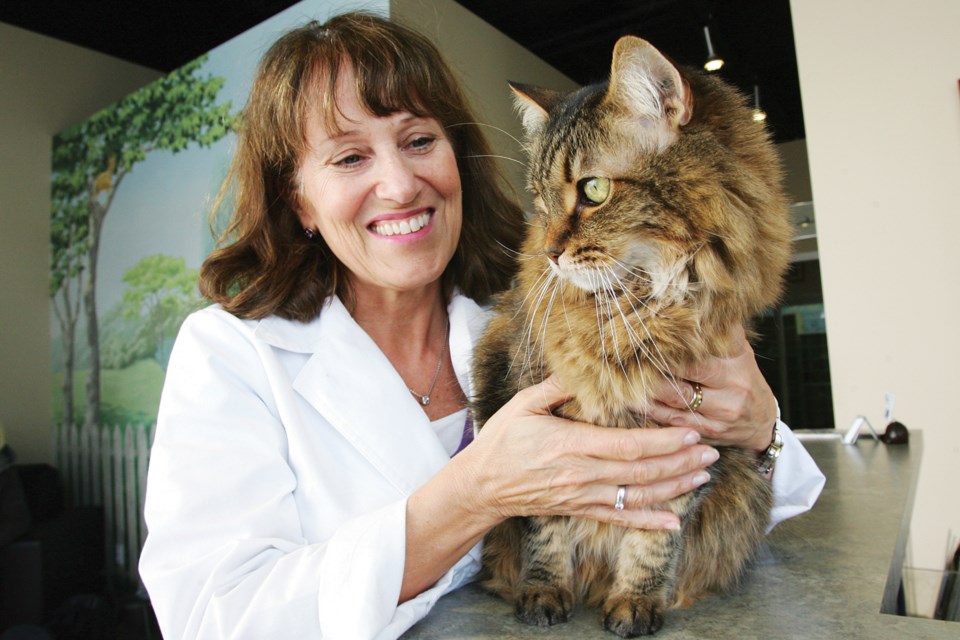Cats are sleepers by day and hunters by night.
Sometimes they purr and rub up against your leg, begging for attention, and sometimes they pretend you’re not even in the room.
These small furry felines continue to surprise and delight with their different and sometimes seemingly sporadic and odd behaviour.
Yet more often than not cats caught eating plants, bringing in mice, scratching furniture or kneading a blanket are acting normal, if not showing signs of affection, says Liz Richards, a veterinarian who has been specializing in felines since 1997. Richards is a veterinarian at All About Cats Veterinary Clinic in North Vancouver and has more than two decades of experience specializing in cats. We asked her about some common cat behaviour to find out what’s normal and what might be cause for concern.
Rubbing
“It’s a very normal behaviour,” says Richards. “Most cats that do that, they’re really just marking the walls or your legs or whatever they’re rubbing against, and they leave behind a pheromone, and it’s sort of a happy pheromone that says that it has a sense of well-being, they’re happy. It’s a good thing.”
It’s also a marking of recognition to let the owner know the cat believes that area to be its home.
Bringing home mice
“Cats are born to hunt,” says Richards. They are genetically designed to be predators, and have eyes that are very keen on movement making them amazing hunters.
“A cat that would be outside 24/7 would hunt and eat many mice a day,” she says. “They would spend their whole time hunting these mice.”
It is a very normal cat behaviour, she says.
Eating plants
“Yes, cats often do that and that can be very dangerous,” says Richards.
While it is a normal behaviour exhibited in many felines, every cat owner should take precautions against owning small and leaf-like plants, which tend to be more enticing. Lillies, for example, are toxic to cats and can cause kidney failure.
Sleepy during the day, active at night
“Cats, as they age, will gradually sleep more,” says Richards. “A cat that suddenly sleeps a lot more that would be reason to see a veterinarian.”
Just like individual humans, every cat is different, and those that have bursts of energy at night are not necessarily experiencing abnormal behaviour.
Talkative cats
Some cats make sounds that may cause concern.
“Increased vocalization can be the sign of pain,” says Richards. “So a cat that might have crystals in their bladder or an inflammation of the blood might vocalize.”
Talkative cats can also be speaking out about their pain associated with other conditions such as hypertension, high blood pressure, or hyper thyroidism (a common senior cat disease). Cats that are deaf will vocalize more, or an older cat might be going senile, says Richards.
Licking
Cats that lick their paws are most likely taking a bath, explains Richards. The only time to pay attention is when a cat licks to the point of removing hair or damaging skin, then it’s time to bring your kitty in for a check-up.
Kneading and suckling
While many people believe this behaviour comes from the cat being taken away from its mother early, Richards says it’s not too rare and people shouldn’t be bothered by it.
Drinking from the toilet
This behaviour is not as common but it is not a sign of strange behaviour.
“The best thing to do is to have multiple water bowls throughout the house,” advises Richards. “What I’ve discovered is that having water by the food dish is not good enough.”
She recommends bowls placed beside a bed or in a bathroom. If your cat still doesn’t take to it, try a container switch.
“Cats sometimes like to drink out of glasses,” says Richards.
Also pay attention to the temperature of the water, as some cats prefer it warm or room temperature to cold.
Staring off into the middle distance
Whether or not this behaviour is normal depends on the cat.
If this is a sudden, new behaviour in an older cat, there could be a medical reason for it, including dementia or pain. But that’s not the case with all cats.
Scratching
“It’s probably one of the most annoying behaviours that cats do, but it is a normal cat behaviour,” says Richards.
Like rubbing, it’s a way of marking territory. A cat’s scent glands are inside its claws, which stick to the surface they lovingly shred.
To avoid having your furniture wrecked, look into good quality scratching posts and, if it still continues, try a little water pistol or make loud noises during the act to discourage the damaging behaviour.
Spraying
“Both males and females will spray urine,” explains Richards. “The number 1 message there is to rule out a medical problem first before you decide it’s behavioral.”
But don’t wait too long to address the issue.
“The minute he or she sprays the house it should be an appointment because that could be a signal that there’s something wrong with the bladder,” says Richards. “Any time your cat uses your house like a litter box, it should be cause to call your veterinarian.”
Catnip
“I feel it’s very safe to use,” says Richards, adding because we spay and neuter them we take away their mating behaviour, we take away their hunting behaviour, we take away a lot of their socialization we need to stimulate and make their indoor environment more interesting for them.
She also recommends cat toys or even something as simple as a cardboard box.



